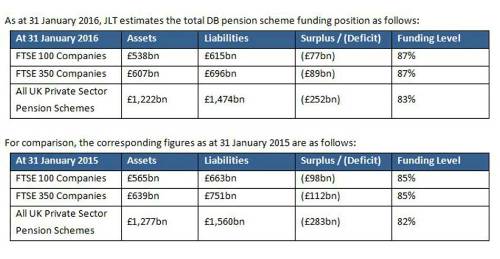
Charles Cowling, Director, JLT Employee Benefits, comments: “2016 has not started well for companies with DB pension schemes. A falling oil price, weakening pound and volatility in Chinese markets have all been factors in a difficult month for markets which has seen asset prices fall and pension deficits rise - albeit to lower levels than 12 months ago.
“More worrying for pension schemes, possibly, is the outlook for interest rates. The latest official inflation release from the Office for National Statistics highlighted that the CPI inflation index averaged 0% over 2015 as a whole – the weakest performance since records began in 1950. Against this backdrop, Mark Carney, the Governor of the Bank of England, has dismissed any prospect of an imminent rise in interest rates.
“Last July, Mark Carney gave a speech in Lincoln at which he indicated that the next rise in interest rates would come into sharper relief around the turn of the year. However at a recent speech at Queen Mary University, Mark Carney said that now is not the time to raise interest rates, suggesting that since last summer progress has been insufficient to warrant a tightening of monetary policy – “The world is weaker and UK growth has slowed.
“As a result of Mark Carney’s comments, market expectations for the next rise in interest rates have moved all the way out to the second half of 2017. For DB pension schemes this means there is going to be no imminent relief to the impact of record low interest rates on pension liabilities and pension deficits. Moreover, the prospect of an imminent Brexit vote could yet spook markets further. This pressure on deficits is also likely to see yet more increases in pension funding demanded by trustees.
“Adding to these woes, 2016 will see the end of contracting-out and further tax changes to pensions, namely the reduction in the annual and lifetime allowances, with possibly even more dramatic change to come in the March Budget. These changes mean that even putting deficits and soaring costs aside, DB pension provision is looking less and less attractive in the private sector. We have already seen many large firms, from Tesco to United Utilities, close down or announce the closure of their DB pension schemes in 2015. It is no surprise therefore that we expect 2016 to be the year that, within the private sector at least, those last few companies still hanging on to their DB schemes will finally throw in the towel and switch over to Defined Contribution entirely for employee pension provision.”
|

